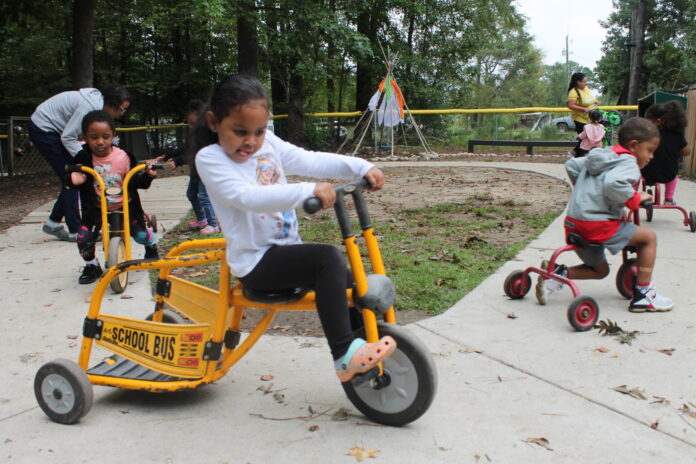Imagine a North Carolina in which every child has the resources and support to thrive and enter kindergarten ready to succeed — this is the vision that has driven the Smart Start Network for over 30 years.
In 1993, North Carolina took a bold step by enacting and funding legislation to create Smart Start, the nation’s first statewide, and state-to-local, comprehensive early childhood system.
Smart Start is a public-private partnership consisting of The North Carolina Partnership for Children (NCPC) and 75 local public-private partnerships that serve all 100 North Carolina counties. Local partnerships provide evidence-based/evidence-informed programs and services to children from birth-to-five and their families. NCPC serves as a central hub for planning, evaluation, and innovation; fiscal and programmatic accountability; and the Network shared services.
Governor Cooper proclaimed September 2024 as Smart Start Month. This proclamation is a testament to North Carolina’s lasting commitment to early childhood, and to Smart Start’s impact on North Carolina’s children and families.
Research demonstrates that Smart Start’s impact extends into elementary school, with benefits including higher test scores, reduced grade retention, and fewer special education placements. It is critical that Smart Start continues this positive trajectory.
How Smart Start works
Local partnerships know their communities well. Through relationships, regular needs assessments, and strategic planning, paired with systems-building skills, local partnerships make informed decisions to best fit the unique circumstances of their communities. They then leverage their state Smart Start dollars to maximize their impact.
At the state level, NCPC maintains and builds the necessary infrastructure and provides strategic direction to ensure local partnerships can effectively work within their communities. This infrastructure provides the backbone for data-driven decision-making, ensures our state’s investments go where they are needed, and helps the network administer statewide programs.
Smart Start’s general impact
Smart Start’s impact includes:
- Improving coordination and alignment of services for children and families.
- Ensuring early care and education is high quality, child-focused, family-friendly, and more easily accessible to families.
- Advancing child health and development through partnerships with early care and education programs and medical practices.
- Partnering with families to enhance family engagement and their mental and physical well-being.
- Supporting families and providers’ understanding and implementation of early literacy activities. This includes the administration Dolly Parton’s Imagination Library. Fifty percent of North Carolina children aged 0-5 are now receiving books at their home.
Smart Start’s role in North Carolina’s early care and education system
Smart Start engages in nearly every facet of the mixed delivery system of early care and education in North Carolina. The network administers state, federal, local, and private programs and services, such as NC Pre-K, child care subsidy, Head Start, and NC Child Care Tri-Share, serving as North Carolina’s primary partner for quality early care and education.
Network impacts from last fiscal year include:
- Each local partnership serving as the co-chair of their county’s NC Pre-K Advisory Committee.
- Forty-six local partnerships administering the NC Pre-K program in 55 counties through separate contracts with the Division of Child Development and Early Education (DCDEE).
- Smart Start managing over $65 million in subsidy funds locally to boost early education effectiveness while increasing access for children who are most under-resourced.
- Sixty-eight percent of local partnerships serving as Child Care Resource & Referral agencies, providing a link between child care providers, families who need care, and employers and community planners who address child care needs.
- Smart Start partnering with DCDEE to launch a two-year NC Tri-Share Child Care Pilot Program. This continues a history of increasing access to affordable, high-quality child care as well as supporting children and families, child care providers, today’s workforce, and the workforce of tomorrow.
Smart Start supports families: Children’s first and most important caregivers and teachers
Smart Start recognizes that families are their children’s first teachers. NCPC’s Family Engagement and Leadership Initiative partners with families throughout the state to support family engagement and leadership. This is especially important as many children birth-to-five are not in child care.
Smart Start offers over 50 family support programs for Local Partnerships to choose from. Programs include Parents as Teachers (PAT), Nurse Family Partnership (NFP), Nurturing Parenting Program (NPP), and Kaleidoscope Play and Learn. Through these initiatives the network demonstrates its whole-child approach, nurturing children comprehensively by addressing their diverse needs. This support can fall into priority areas of early care and education; family support, including early literacy; and child and family health.
Our why
The first five years of life are critical for brain development. Smart Start focuses on this period of early childhood as many children do not have access to the essential experiences or environments that foster healthy brain development, such as supportive child-parent interactions, effective early care and education, and health care.
North Carolina faces mounting challenges including a child care crisis and a mental health crisis. According to the KIDS COUNT Data Book, North Carolina stands as 33rd in the nation in the nation in terms of child well-being. The Data Book measures how each state fares based on economic well-being, education, health, and family community. North Carolina has the eighth worse state ranking in the country for maternal and infant health mortality.
Investing smart, investing in Smart Start
Our youngest children deserve better. Investment in Smart Start allows for cost-effective, efficient, responsive, thoughtful, and innovative solutions that address children’s needs comprehensively within their own communities.
If you believe in early childhood, please reach out to your local Smart Start. Reach out if you’re a parent or grandparent of a young child and need support. Reach out if you want to partner to provide programs and services to young children and their families.
Join in community-wide efforts so that our state’s youngest can grow to be healthy, productive, and well-rounded people who thrive as students, workers, parents, and leaders. We must do so soon — as the first five years are a once-in-a-lifetime opportunity for us to create change forever.
Every child in North Carolina deserves the opportunity to thrive. Let’s make sure every child has the opportunity to thrive through Smart Start.




